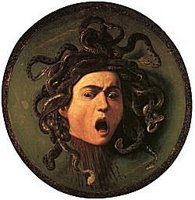
Monday, September 25, 2006
The Daily Hump: What's next, Gormagons?
Today you get two words for the price of one hump.
First, let's begin with the Gormagon, which was recently featured as Michael Quinion's "Weird Word". A Gormagon can be one of two things; it's I wonder whether the word is related to Gorgon, the three snake-haired sisters of which Medusa is the most well-known. Gorgon is from a Greek word meaning "terrible" and the Gormagon certainly seems terrible. In case you're wondering Gorgonzola cheese is named after a village near Milan and has no connection to Gorgons from what I can tell; however, I might be wrong.
I wonder whether the word is related to Gorgon, the three snake-haired sisters of which Medusa is the most well-known. Gorgon is from a Greek word meaning "terrible" and the Gormagon certainly seems terrible. In case you're wondering Gorgonzola cheese is named after a village near Milan and has no connection to Gorgons from what I can tell; however, I might be wrong.
Next up, next. If we trace the history of the English language back through time we eventually hit a point where it does not exist as a distinguishable language of its own. We know Middle English came before Modern English and Old English came even earlier, but what language gave birth to Old English? The answer is Old Frisian, a language spoken on the European North Sea coast from the 8th to 16th centuries. The people who settled in England from the 4th century onward came from these shores and brought with them their vocabulary, including the word next.
Next started off as the superlative form of nigh or near. Around the late 14th century, the word nighest came in to existence, followed by nearest in the 15th century. Around the same time that next fell out of fashion in the superlative sense the OED notes "The notion of greatest proximity tends to be merged into that of adjacency, either within a sequence or series or simply as regards physical location." Henceforth, next began its next life meaning "immediately following."
Gormagon [OED]
Gorgon [OED]
next [OED]
Old Frisian [Wikipedia]
First, let's begin with the Gormagon, which was recently featured as Michael Quinion's "Weird Word". A Gormagon can be one of two things; it's
A monster with six eyes, three mouths, four arms, eight legs, five on one side and three on the other, three arses, two tarses [penises], and a cunt upon its backFunny enough, a Gormagon can also refer to a member of an 18th century society that imitated the Freemasons. The etymology is pretty much unknown with the OED claiming it's a nonsenical word that has "pseudo-Chinese" roots ("1725 Two Letters in Grand Mystery of Freemasons (ed. 2) 13 The Venerable Order of Gormogons having been brought into England by a Chinese Mandarin.")
 I wonder whether the word is related to Gorgon, the three snake-haired sisters of which Medusa is the most well-known. Gorgon is from a Greek word meaning "terrible" and the Gormagon certainly seems terrible. In case you're wondering Gorgonzola cheese is named after a village near Milan and has no connection to Gorgons from what I can tell; however, I might be wrong.
I wonder whether the word is related to Gorgon, the three snake-haired sisters of which Medusa is the most well-known. Gorgon is from a Greek word meaning "terrible" and the Gormagon certainly seems terrible. In case you're wondering Gorgonzola cheese is named after a village near Milan and has no connection to Gorgons from what I can tell; however, I might be wrong.Next up, next. If we trace the history of the English language back through time we eventually hit a point where it does not exist as a distinguishable language of its own. We know Middle English came before Modern English and Old English came even earlier, but what language gave birth to Old English? The answer is Old Frisian, a language spoken on the European North Sea coast from the 8th to 16th centuries. The people who settled in England from the 4th century onward came from these shores and brought with them their vocabulary, including the word next.
Next started off as the superlative form of nigh or near. Around the late 14th century, the word nighest came in to existence, followed by nearest in the 15th century. Around the same time that next fell out of fashion in the superlative sense the OED notes "The notion of greatest proximity tends to be merged into that of adjacency, either within a sequence or series or simply as regards physical location." Henceforth, next began its next life meaning "immediately following."
Gormagon [OED]
Gorgon [OED]
next [OED]
Old Frisian [Wikipedia]
Labels: Chinese, Greek, Middle English, Old English, Old Frisian, The Daily Hump
:: posted by David, 8:14 AM
1 Comments:
The Gormagon is actually an old English riddle in the fine ribald tradition of the Exeter book. The answer is a man and a woman riding a horse. The woman rides side-saddle, giving them 5 legs on one side and 3 on the other; and the two tarses and one cunt indicate that the horse is a stallion rather than a mare. Fun, huh? Go try it on your friends! ;)
